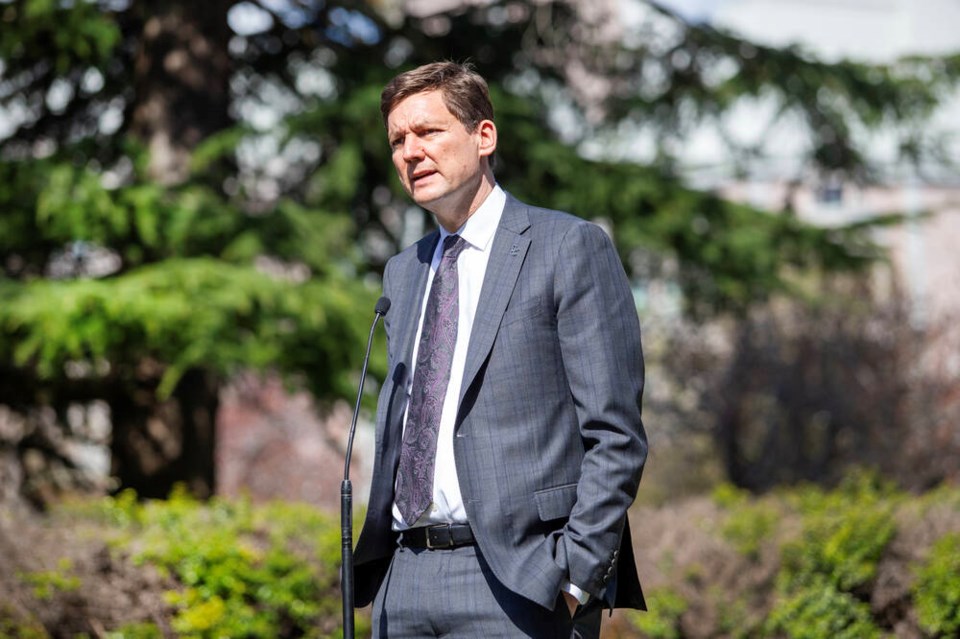One month after backing down from the power grab that was Bill 7, the B.C. government is at it again with new legislation that gives cabinet extraordinary powers to rewrite the approval rules for major projects it deems as special.
Or, put another way, it’s just Bill 7 in a hard hat.
The legislation, called the Infrastructure Projects Act, would be a wholesale change in the permitting and environmental assessment process for everything from schools, to hospitals, mines, hydrogen plants, food security projects, water infrastructure and even housing.
Instead of going through normal environmental reviews, cabinet could deem any project one of “provincial significance” and unlock a vast slate of powers to push it forward.
That includes rewriting an entirely new “expedited environmental assessment” process for any project, where cabinet sets the scope, methods, timelines, public engagement requirements, who conducts the review and even — if necessary — just issue the environmental assessment certificate itself. Currently, that process is all spelled out in law, along with strict rules on statutory decision-makers who can reach conclusions about projects independent of government based upon the evidence before them.
Premier David Eby, once again, pointed to U.S. President Donald Trump for the end-run on legal process. Government needs to be faster to grow the economy, he argued, and it is currently bogged down in a morass of inefficiencies and needless delays.
It is, however, a deeply ironic sentiment given that the suffocating mass of red tape and bureaucracy has grown worse under an NDP government that tried to strengthen the environmental process, set more stringent standards, and for years has been on a hiring blitz of civil servants to oversee a process it now deems as too cumbersome. Instead of undoing that mess, the government intends simply to sidestep it entirely.
The premier’s justification for expediency was similar to the one he used in March for Bill 7, which would have given cabinet the ability to bypass the legislature for two years to change any law, under the argument government needed to be more nimble to respond to the mercurial president.
Eby ultimately backed down on the proposal, amidst an outcry from former premiers, business groups, Indigenous leaders and legal experts, who called it a draconian overreach of government power that would harm democracy.
But the sentiment clearly did not die within the administration. It lives on in this new bill —a complete concentration of power into cabinet in the same way envisioned by Bill 7.
A permit taking too long for a politically sensitive construction project? A minister can intervene and designate someone to approve it, or even make the approval automatic. A politically sensitive project stuck? Cabinet can unilaterally move it to the front of the line. A local government holding things up? Ministers can “intervene to develop measures to address delays for the designated project” by overriding the municipality and all those pesky elected local officials.
As with Bill 7, Eby made no apologies for the move.
“We think that faster delivery of public projects and major economic projects in the province will be popular with the public,” he said Thursday.
“We think it's what the public wants. They don't want a huge amount of process debating whether or not it's a good thing to build a new school. They just want the school.”
Eby cited a school delayed for six months while a municipality updated its Official Community Plan, and another delayed for a year due to a ditch on the property that was identified as significant under the Water Sustainability Act.
“We do need that ability on these critical projects to be able to ensure they move ahead and don't get stuck,” he said.
Fast-tracking schools is one thing. Pushing a mine through a cabinet-created, politically motivated new environmental assessment process is another — especially in a province barely 10 years removed from the Mount Polley Mine tailings dam disaster.
Eby said he won’t use the powers to expedite new pipelines or LNG facilities. And Infrastructure Minister Bowinn Ma said she won’t use it to force low-barrier supportive housing and drug consumption sites onto municipalities.
But everything else is still on the table with this legislation. It proves once again that when it comes to this government, Trump is just convenient cover for the ultimate consolidation of power.
In other news
• The B.C. government continues to scramble to respond to the Lapu Lapu tragedy, with the premier ordering a full review of the Mental Health Act just a few weeks after his special advisor concluded one wasn’t needed. Les Leyne writes more.
• Is B.C. scrapping EV rebates in part to ensure money doesn’t go to Elon Musk’s Tesla corporation? Turns out, yes.
• B.C. business groups seek drastic action from the federal government to diversify trade as tariff pressures mount. [BIV]
Rob Shaw has spent more than 17 years covering B.C. politics, now reporting for CHEK News and writing for Glacier Media. He is the co-author of the national bestselling book A Matter of Confidence, host of the weekly podcast Political Capital, and a regular guest on CBC Radio.
🚨New newsletter alert! Stay ahead of the curve in B.C. politics. Get expert political analysis delivered straight to your inbox, plus inside scoops and other stories from across the province.


